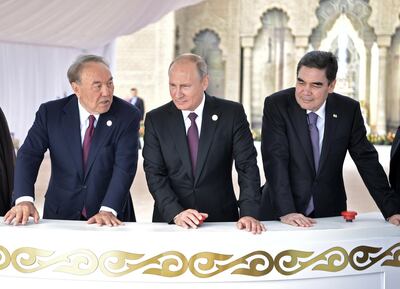When is a sea not a sea?
The Caspian is more than a kilometre deep at its deepest, it has waves and tides and its area is not much less than the Red Sea or Baltic. But, with no link to the oceans, its legal status has long been in dispute. A meeting in Kazakhstan this month aimed to resolve that, which could open up oilfields and pipeline routes.
Soviet-era treaties allowed equal access to the surface waters but since the USSR’s collapse, Iran has maintained the Caspian is a lake, which would give all five littoral states an equal share of its resources.
But Russia’s position is complicated and the other neighbours, Kazakhstan, Turkmenistan and Azerbaijan, have generally maintained that, like maritime boundaries, the seabed should be demarcated by a median line equidistant from their shore, with some modifications. Under this method, Iran would receive the smallest share. Kazakhstan, Azerbaijan and Russia have already carved up the northern part of the sea on this basis, in 2003, and Kazakhstan and Turkmenistan agreed their border in 2015.
With this legal certainty, Kazakhstan has proceeded with development of the supergiant Kashagan oilfield, one of the largest found in the world over the past two decades, which started production in 2016. Russia has some smaller fields, while Azerbaijan has produced from its shallow offshore since 1950 and BP has operated its large Azeri-Chirag-Guneshli field since 1995. Dragon Oil, now wholly owned by the Dubai Government’s Enoc, has enjoyed great success in developing the Cheleken oilfields off Turkmenistan. The billion-barrel Kyapaz/Serdar field, though, remains undeveloped in the absence of an accord between Turkmenistan and Azerbaijan.

Meanwhile, Iran has been left out of the Caspian oil rush, partly because of US and international sanctions, partly because of its failure to offer an attractive commercial model, and partly because of difficulties in drilling in the southern Caspian, the deepest part. Reservoirs are exceptionally far below the seabed and pressures high. With no access to oceans, drilling rigs have to be constructed in the Caspian itself, or disassembled and brought in via canals.
In 2001, Iranian gunboats warned off BP survey vessels working in a disputed area, on what Iran calls the Alborz field, and Azerbaijan refers to as Araz-Sharg-Alov. In 2012, Iran discovered the Sardar-e Jangal field in 700 metres of water south of Alborz, claimed to hold 50 trillion cubic feet of gas and 2 billion barrels of oil, but has not developed it. But in June, Tehran did reach agreement with Baku over joint development of another shared field.
The meeting of all five littoral states, in the Kazakh port of Aktau on August 12, settled some but not all of the outstanding questions. They agreed the Caspian is a sea but with a special legal status. The convention allows freedom of access by the signatories to all the Caspian’s waters, prevents non-Caspian countries deploying military forces there and agrees that the seabed should be subdivided but without specifying how. It allows the states to reach bilateral agreements on demarcation and on the construction of pipelines, rather than requiring the consent of all.
The deal was received badly by many in Iran. Mahmoud Sedighi, a Reformist parliamentarian, tweeted that Iran’s 50 per cent share of the sea had been reduced to 11 per cent, and compared the convention to the despised 1828 Treaty of Turkmenchay, which gave up much Iranian territory to the Tsar of Russia. Opponents complain that Russian warships will now rule the waves, and fear Iran will emerge with only a small claim over the sea’s resources.
_______________
Read more:
The gas that came in from the cold
A luxury guide to Baku, Azerbaijan
_______________
But Tehran’s weak bargaining position forced it to sign. Better relations with its northern neighbours free its hands to concentrate on other threats. It is reliant on Russian support against sanctions and in Syria and it has to forestall the possibility of American or Israeli use of Azeri or Kazakh bases. And, unlike the others, it has failed to create “facts on the seabed” by developing any hydrocarbons in its undisputed sector.
Conversely, the accord could be good news for Turkmenistan. Holder of the fourth-largest gas reserves in the world, it sends most of its output to China, after Russia cut off its access to other markets. For more than two decades the prospect of a “Trans-Caspian pipeline” through Azerbaijan to access Turkish and European customers has long tantalised oil companies and European strategists keen to diversify away from Russian supplies. German chancellor Angela Merkel visited Baku, Azerbaijan's capital, on Saturday, with gas supplies on her agenda.
Dragon Oil, which has to burn off the unwanted gas from its oil production for lack of a route to market, is one of several companies that could supply the Trans-Caspian line. But opposition from Russia and Iran, tepid interest from Azerbaijan which would not want to facilitate a competitor to its own gas, and Turkmen indecision and inertia, have long stalled progress. There are several competitors, including Russia itself, to supply Europe at lower prices.
As I told a European envoy in 2012, purely political pipelines don’t get built. Instead of the grand Trans-Caspian, or the Turkmenistan-Afghanistan-Pakistan-India pipeline persistently promoted by perspiring US diplomats, the Turkmens may sell a smaller amount of gas the short distance to Azerbaijan and perhaps Turkey.
More Caspian oil may also flow in the next few years if border demarcation proceeds. But Moscow can be confident that its minor concessions leave its gas markets secure. The convention has further reinforced Russia’s guard on its soft underbelly, and emphasised Tehran’s and Brussels’ disadvantages.
Robin M. Mills is CEO of Qamar Energy, and author of The Myth of the Oil Crisis


